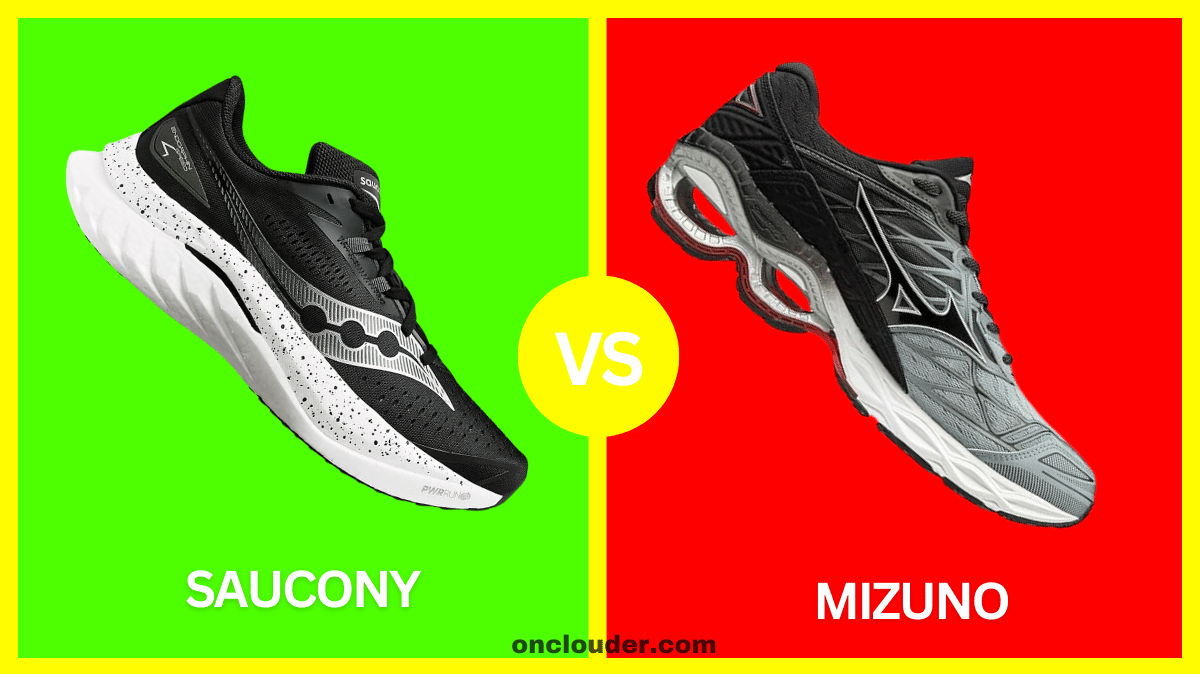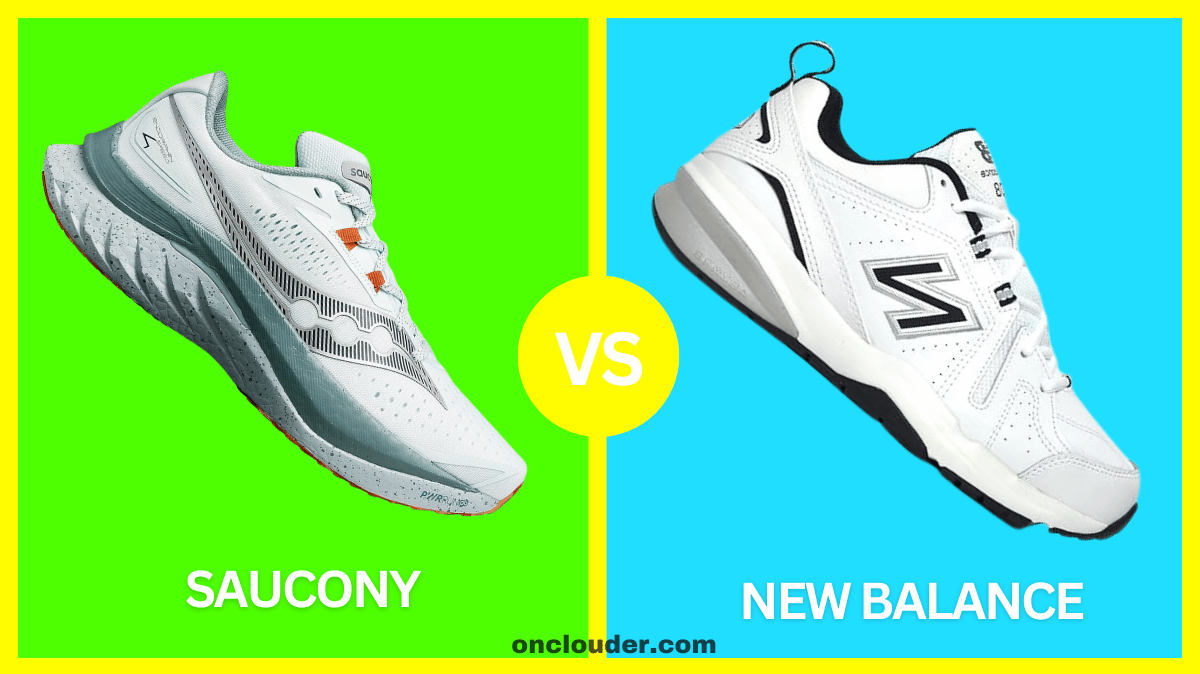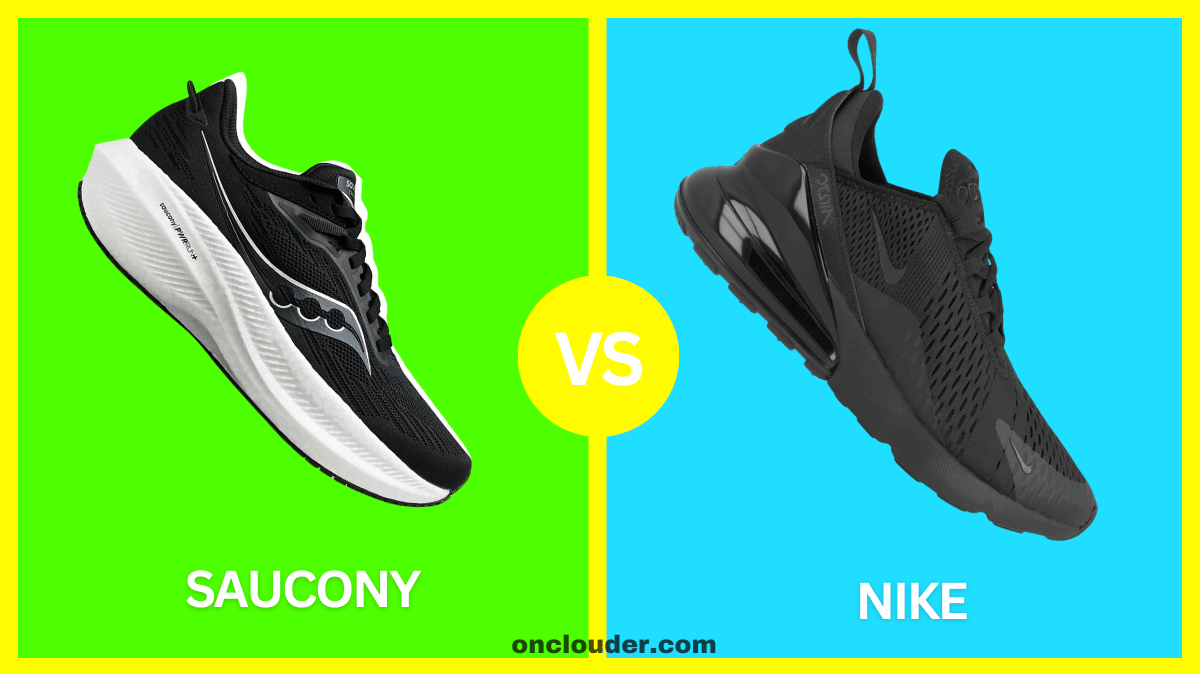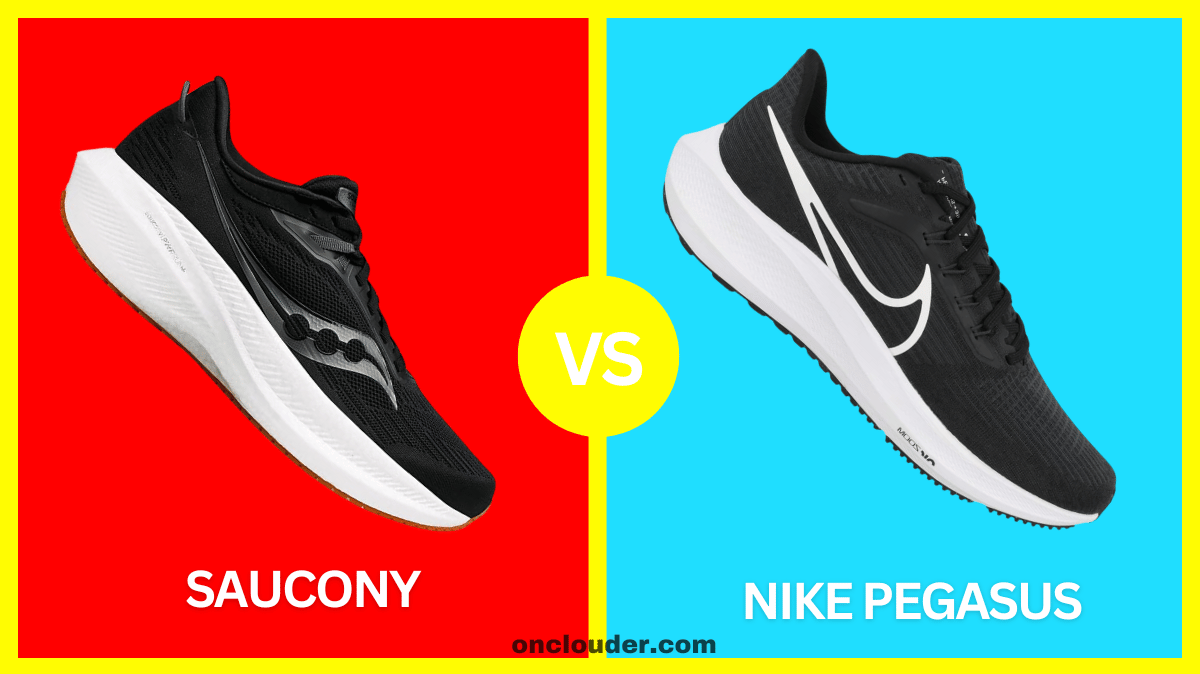Are you trying to decide between Saucony and Mizuno for your next pair of running shoes? Don’t worry, we’ve got you covered!
We’ll compare these two popular brands to help you make the best choice for your feet.
We’ll look at everything from how comfy they are to how long they last, so you can pick the perfect pair for your next run or walk.

Contents
- 1 Quick Comparison: Saucony vs Mizuno Shoes
- 2 What Makes Saucony and Mizuno Special?
- 3 Comfort: Which Feels Better on Your Feet?
- 4 Durability: Which Shoes Last Longer?
- 5 Breathability: Keeping Your Feet Cool
- 6 Cushioning: Protecting Your Feet
- 7 Shoe Fit: Finding Your Perfect Match
- 8 Stability: Keeping You Steady
- 9 Quality: Getting Your Money’s Worth
- 10 Style: Looking Good While You Run
- 11 Size Range: Finding Your Fit
- 12 Materials: What Are These Shoes Made Of?
- 13 Weight: Light on Your Feet
- 14 Flexibility: Bending with Your Foot
- 15 Water Resistance: Staying Dry
- 16 Sole: Where the Rubber Meets the Road
- 17 User Reviews: What Do Other Runners Think?
- 18 Price Comparison
- 19 Pros and Cons
- 20 Conclusion
- 21 Frequently Asked Questions
Quick Comparison: Saucony vs Mizuno Shoes
The main difference between Saucony and Mizuno shoes is their fit and feel. Saucony shoes often have a softer, more cushioned ride, while Mizuno shoes tend to be firmer and more responsive.
Saucony offers a wider toe box, making them comfy for wider feet. Mizuno shoes have a snugger fit and are known for their wave plate technology.
Now, let’s create a detailed comparison table for Saucony vs Mizuno shoes:
| Feature | Saucony | Mizuno |
| Cushioning | Softer, more plush | Firmer, more responsive |
| Fit | Wider toe box | Snugger fit |
| Technology | PWRRUN foam | Wave plate technology |
| Weight | Generally lighter | Usually slightly heavier |
| Durability | Good | Very good |
| Price range | $80 – $160 | $100 – $180 |
| Popular for | Road running, daily use | Long-distance running |
| Stability | Moderate | High |
In summary: Saucony and Mizuno make good running shoes, but they feel different when you wear them. Saucony shoes are softer and have more room for your toes. Mizuno shoes are firmer and fit tighter. Both brands use special tech to make their shoes comfy and help you run better.
What Makes Saucony and Mizuno Special?
Before we dive into the details, let’s talk about what makes these brands stand out. Saucony and Mizuno are both well-known for making great running shoes. They each have their own special way of making shoes that feel good and help you run your best.
The Saucony Story
Saucony has been around for a long time – since 1898! They started out making shoes for kids but now they’re famous for their running shoes. Saucony likes to use new technology to make shoes that help runners go faster and feel more comfortable.
Meet Mizuno
Mizuno is a Japanese company that’s been making sports gear since 1906. They make all kinds of sports stuff, but their running shoes are really popular. Mizuno is known for making shoes that feel bouncy and help protect your feet when you run.
Now that you know a bit about each brand, let’s see how they compare in different areas that matter to runners and walkers.
Comfort: Which Feels Better on Your Feet?
When you’re picking running shoes, comfort is super important. After all, you want your feet to feel good whether you’re going for a short jog or a long run.
Saucony’s Comfort Features
Saucony shoes often feel soft and cushiony. They use special foam in many of their shoes that makes you feel like you’re running on clouds. This can be really nice if you have sore feet or if you’re running on hard surfaces like roads.
Mizuno’s Approach to Comfort
Mizuno shoes might feel a bit firmer than Saucony, but many runners like this. The firmness can make you feel more connected to the ground, which some people prefer. Mizuno also uses special technology to make their shoes feel springy, which can help you feel like you’re running with less effort.
Durability: Which Shoes Last Longer?
Nobody wants to buy new shoes all the time, so it’s good to know how long your shoes might last.
Saucony’s Durability
Saucony shoes are generally pretty tough. They use strong materials that can handle lots of miles. Many runners say their Saucony shoes last for 400-500 miles of running, which is pretty good!
Mizuno’s Longevity
Mizuno is also known for making durable shoes. They often use rubber on the bottom of the shoe that’s extra tough, which helps the shoes last longer. Some Mizuno fans say their shoes can last even longer than 500 miles.
Breathability: Keeping Your Feet Cool
Nobody likes sweaty, smelly feet. That’s why it’s important for running shoes to let air flow through them.
Saucony’s Ventilation
Saucony uses mesh in many of their shoes to help air move in and out. This can help keep your feet cooler and drier, even on long runs.
Mizuno’s Air Flow
Mizuno also cares about keeping your feet cool. They use special fabrics that let air pass through easily. Some Mizuno shoes even have extra ventilation in the toe area, which can be really nice on hot days.
Cushioning: Protecting Your Feet
Good cushioning in your shoes can help protect your feet and legs from the impact of running.
Saucony’s Cushioning Technology
Saucony is famous for their cushioning. They use different types of foam to make shoes that feel soft but still give you energy when you run. Some of their shoes have extra cushioning in the heel, which can be great if you tend to land on your heel when you run.
Mizuno’s Unique Approach
Mizuno does cushioning a bit differently. They use something called a “wave plate” in many of their shoes. This is a special piece in the sole that helps spread out the impact when your foot hits the ground. Some runners really like how this feels.

Shoe Fit: Finding Your Perfect Match
Getting a shoe that fits just right is super important. Let’s see how Saucony and Mizuno compare when it comes to fit.
Saucony’s Fit Options
Saucony makes shoes in lots of different widths, from narrow to extra wide. This can be really helpful if you have feet that are wider or narrower than average. They also tend to have a roomy toe box, which gives your toes space to spread out.
Mizuno’s Sizing Approach
Mizuno shoes often have a snugger fit, especially in the middle of the foot. Some runners really like this because it makes them feel secure. But if you have wider feet, you might need to go up a half size in Mizuno shoes.
Stability: Keeping You Steady
If your feet tend to roll inwards (called overpronation) when you run, you might need shoes with extra stability features.
Saucony’s Stability Options
Saucony makes several shoes designed for runners who need extra stability. These shoes have special features that help keep your foot from rolling too far inwards. They’re not as stiff as some other brands’ stability shoes, which some runners really like.
Mizuno’s Support Systems
Mizuno also offers stability shoes, but they do it in their own unique way. Their wave plate technology helps provide support without making the shoe too heavy. Some runners find Mizuno’s stability shoes to be a good balance of support and flexibility.
Quality: Getting Your Money’s Worth
When you’re spending money on running shoes, you want to make sure you’re getting good quality.
Saucony’s Quality Control
Saucony has a good reputation for making high-quality shoes. They use durable materials and pay attention to details like stitching and gluing. This means their shoes often hold up well over time.
Mizuno’s Craftsmanship
Mizuno is known for their careful manufacturing process. They take pride in making shoes that are well-constructed and use high-quality materials. Many runners appreciate the attention to detail in Mizuno shoes.
Style: Looking Good While You Run
While how a shoe performs is most important, it’s also nice to have shoes that look cool!
Saucony’s Style Choices
Saucony offers a good mix of classic and modern designs. They have shoes in lots of different colors, from subtle to bright and bold. If you like shoes that stand out, you might like some of Saucony’s more colorful options.
Mizuno’s Aesthetic
Mizuno tends to have a sleeker, more streamlined look. Their shoes often have a more understated style, which some runners prefer. But don’t worry – they still have plenty of color options if you want something that pops.
Size Range: Finding Your Fit
It’s frustrating when a brand doesn’t make shoes in your size. Let’s see how Saucony and Mizuno compare in terms of size range.
Saucony’s Size Options
Saucony offers a wide range of sizes, typically from US size 5 to 16 for men and 5 to 12 for women. They also offer multiple width options in many of their popular models.
Mizuno’s Size Range
Mizuno also provides a good range of sizes, usually from US size 7 to 16 for men and 6 to 12 for women. They offer some width options, though perhaps not as many as Saucony.
Materials: What Are These Shoes Made Of?
The materials used in running shoes can affect how they feel, how long they last, and how they perform.
Saucony’s Material Choices
Saucony uses a mix of synthetic materials and mesh in most of their shoes. They’re always trying out new foams and fabrics to make their shoes lighter and more comfortable. Some of their shoes use recycled materials, which is great for the environment.
Mizuno’s Material Technology
Mizuno also uses high-tech materials in their shoes. They’re known for their special rubber soles that provide good grip and durability. Mizuno also uses breathable mesh and synthetic materials in the upper part of their shoes.
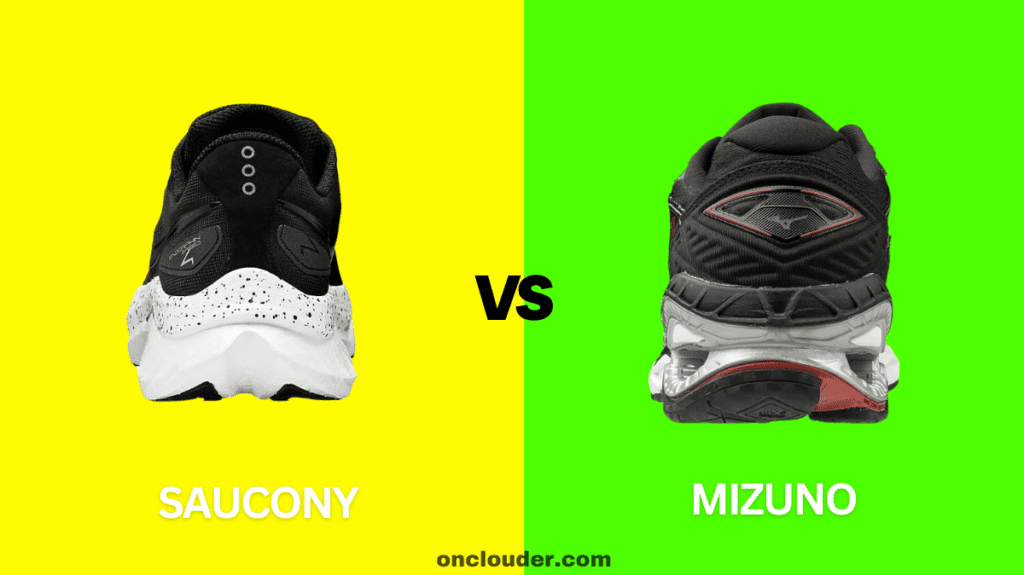
Weight: Light on Your Feet
Lighter shoes can help you feel faster and less tired when you run. But super light shoes might not have as much cushioning or support. Both Saucony and Mizuno try to find a good balance.
Saucony’s Weight Range
Saucony makes shoes in a range of weights. Some of their racing shoes are super light, while their shoes with more cushioning or support features might be a bit heavier. On average, their shoes tend to be on the lighter side compared to some other brands.
Mizuno’s Lightweight Designs
Mizuno is known for making shoes that feel light, even when they have lots of features. Their wave plate technology helps keep the weight down while still providing good support and cushioning.
Flexibility: Bending with Your Foot
Flexible shoes can help your foot move more naturally when you run. But some runners need shoes with less flexibility for support.
Saucony’s Flex Factor
Saucony shoes often have good flexibility, especially in the forefoot (the front part of the shoe). This can help your foot bend naturally as you push off the ground. Their stability shoes might be a bit less flexible, but still allow for natural foot movement.
Mizuno’s Bend and Bounce
Mizuno shoes, with their wave plate technology, have a unique kind of flexibility. The wave plate helps the shoe bend in certain ways while still providing support. Some runners really like how this feels.
Water Resistance: Staying Dry
While most running shoes aren’t completely waterproof, some handle wet conditions better than others.
Saucony in the Rain
Some Saucony shoes have water-resistant uppers that can help keep your feet drier in light rain or wet grass. They also make a few models designed specifically for trail running that have better water resistance.
Mizuno’s Wet Weather Performance
Mizuno also offers some shoes with water-resistant features. Their trail running shoes, in particular, are designed to handle wet conditions well. For road running shoes, the mesh uppers usually dry pretty quickly if they do get wet.
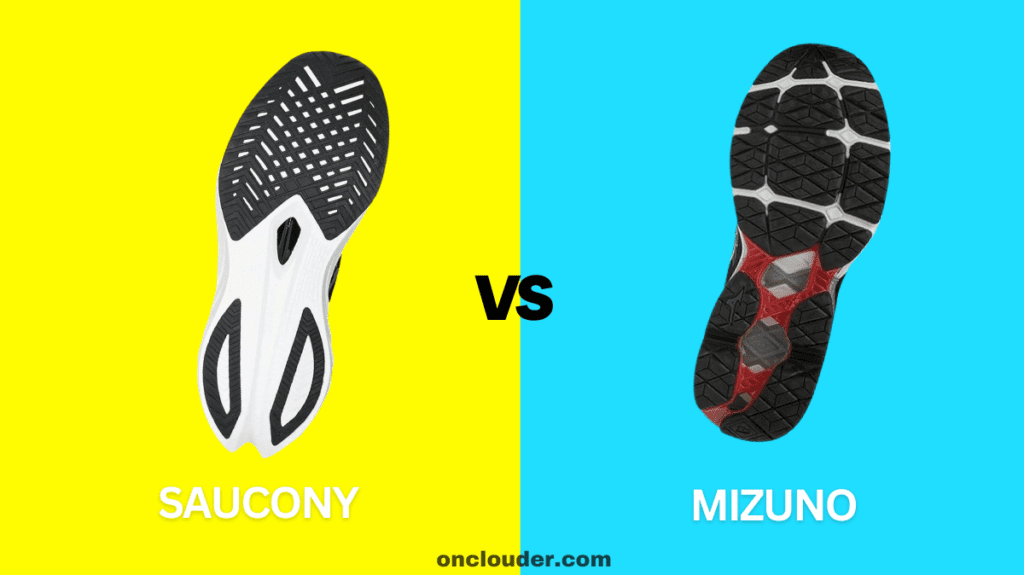
Sole: Where the Rubber Meets the Road
The sole of the shoe is super important – it’s the part that actually touches the ground when you run!
Saucony’s Sole Technology
Saucony uses different types of rubber in different parts of the sole. This helps provide grip where you need it and durability in high-wear areas. Many of their shoes have flex grooves in the sole to help it bend with your foot.
Mizuno’s Sole Design
Mizuno is known for their durable rubber soles. They often use different types of rubber in different areas of the sole for the best mix of grip, durability, and flexibility. The wave plate in the midsole also affects how the sole works, helping to spread out impact forces.
User Reviews: What Do Other Runners Think?
It’s always helpful to know what other people think about these shoes. Here’s a summary of user reviews for both brands:
| Brand | Overall Rating | Comfort | Durability | Value for Money |
| Saucony | ⭐⭐⭐⭐½ | ⭐⭐⭐⭐⭐ | ⭐⭐⭐⭐ | ⭐⭐⭐⭐ |
| Mizuno | ⭐⭐⭐⭐ | ⭐⭐⭐⭐ | ⭐⭐⭐⭐⭐ | ⭐⭐⭐⭐ |
Price Comparison
Here’s a general price range for different types of Saucony and Mizuno shoes:
| Type of Shoe | Saucony Price Range | Mizuno Price Range |
| Entry Level | $80 – $100 | $90 – $110 |
| Mid-Range | $110 – $140 | $120 – $150 |
| Premium | $150 – $180 | $160 – $190 |
| Special Edition | $180+ | $190+ |
Remember, prices can vary depending on where you buy the shoes and if they’re on sale.
Pros and Cons
| Brand | Pros ✅ | Cons ⚠️ |
| Saucony | Soft and comfy | Might wear out faster |
| Roomy for wide feet | Less stable for some runners | |
| Lighter weight | Fewer color choices | |
| Good for everyday use | Can be pricey | |
| Mizuno | Very stable | Can feel stiff at first |
| Lasts a long time | Tighter fit may not suit all | |
| Great for long runs | Often more expensive | |
| Special wave tech for support | Heavier than some other brands |
Conclusion
After looking at all these factors, you can see that both Saucony and Mizuno make great running shoes. The best choice for you depends on what you like and need in a shoe.
You might prefer Saucony if:
- You like shoes with lots of soft cushioning
- You want a wider range of width options
- You’re looking for shoes with a roomier toe box
Mizuno might be better for you if:
- You like a firmer, more responsive feel when you run
- You want shoes with a snugger fit in the midfoot
- You’re a fan of the unique feel of their wave plate technology
Remember, the best way to know if a shoe is right for you is to try it on. If you can, visit a running shoe store and test out both brands. Pay attention to how they feel when you walk and run in them.
No matter which brand you choose, the most important thing is that the shoes feel comfortable and help you enjoy running or walking. Happy shoe shopping!
Frequently Asked Questions
Are Saucony or Mizuno shoes better for beginners?
Both brands offer good options for beginners. Saucony’s cushioned shoes might be more comfortable for new runners, while Mizuno’s supportive designs could help beginners develop good form.
Can I use Saucony or Mizuno shoes for other sports?
While both brands make running shoes, they can be used for other activities too. However, for specific sports like tennis or basketball, it’s better to use shoes designed for those activities.
How often should I replace my Saucony or Mizuno running shoes?
Generally, you should replace running shoes every 400-500 miles. This could be every 4-6 months for regular runners, or longer for occasional runners.
Do Saucony and Mizuno make shoes for kids?
Yes, both brands offer running shoes for kids. Saucony has a wider range of kids’ shoes, including ones for very young children.
Are Saucony or Mizuno shoes good for people with flat feet?
Both brands offer shoes that can work well for flat feet. Look for models with good arch support and stability features.

